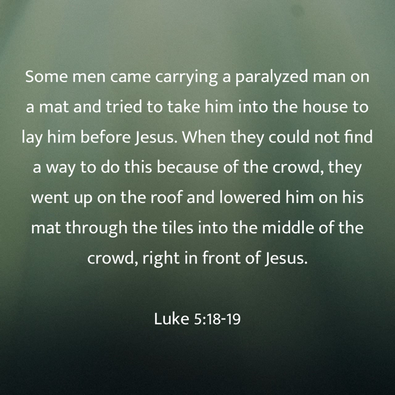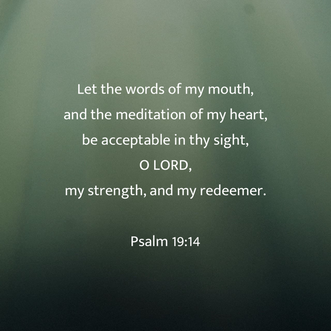|
Good morning!
We're so glad you decided to join us today!
When we meet in person, we share any joys and concerns we might have together. Think about the past week. What prayer requests do you have? If you feel comfortable, you can share them as a comment on this post. When you are ready, use the prayer below, Pope Francis' Prayer for Peace, to get started.
Lord God of peace, hear our prayer!
We have tried so many times and over so many years to resolve our conflicts by our own powers and by the force of our arms. How many moments of hostility and darkness have we experienced; how much blood has been shed; how many lives have been shattered; how many hopes have been buried… But our efforts have been in vain. Now, Lord, come to our aid! Grant us peace, teach us peace; guide our steps in the way of peace. Open our eyes and our hearts, and give us the courage to say: "Never again war!"; "With war everything is lost". Instill in our hearts the courage to take concrete steps to achieve peace. Lord, God of Abraham, God of the Prophets, God of Love, you created us and you call us to live as brothers and sisters. Give us the strength daily to be instruments of peace; enable us to see everyone who crosses our path as our brother or sister. Make us sensitive to the plea of our citizens who entreat us to turn our weapons of war into implements of peace, our trepidation into confident trust, and our quarreling into forgiveness. Keep alive within us the flame of hope, so that with patience and perseverance we may opt for dialogue and reconciliation. In this way may peace triumph at last, and may the words "division", "hatred" and "war" be banished from the heart of every man and woman. Lord, defuse the violence of our tongues and our hands. Renew our hearts and minds, so that the word which always brings us together will be "brother", and our way of life will always be that of: Shalom, Peace, Salaam! Amen.
Today's lesson is on John 1:1-14.
Lesson Context
The Gospels of Matthew, Mark and Luke are called synoptic because of their similar perspectives on recounting the life and ministry of Jesus. John's gospel is quite different, as the writer stresses Jesus' divine identity as both the son of God and messiah. The introduction to this gospel emphasizes the eternality of the Word of God. The Word appears a lot throughout today's passage. The Greek word being translated as Word is logos, where we get our English word logic. Literally, logos translates as word, reason, or plan. Pagan philosophers used this to explain how their gods interacted with the cosmos and created order. When we read passages containing the Word in scripture, we usually think of Jesus Christ. However, in some writings (see here), a distinction is made between Jesus the person, and the Christ. Jesus was the incarnated human being who stood on the Earth. The Christ, the Messiah, is the eternal part. Our book says that the gospel of John was likely written by Jesus' disciple John during the second half of the first century. This is the "disciple whom Jesus loved," (John 21:20). The same person is also given credit for writing 1, 2, and 3 John, and Revelation. He seems to have had a broad audience, of both Jews and Gentiles.
1. The Eternal Word
The gospel begins with a parallel of Genesis: In the beginning. This highlights that God is eternal, beyond our concepts of space and time. Also, the Word is eternal. God the Father and the Word are of the same nature, but are two distinct persons. Genesis tells how God created by his word. John applies the idea to the work of the eternal Word in him making all things. The Word is the source of life, and through the Word, all things came into existence. The Word is creative and personal. The Word did not simply create life. The substance of life is more than physical, because eternal life is in the Word. The Word brought light into the world, contrasting with the world's darkness. We can think about this as part of the creation story in Genesis. But John is talking about spiritual light in contrast to darkness. Our book says that the darkness might refer specifically to people who have resisted the Word, or more generally to the status of the world as a whole. Either way, the important thing is that the darkness has not overcome the scope of God's light.
2. The Human Witness
The human witness was a man sent by God - John the Baptist. He served as a prophet. He testified about the coming of the light into the world.
3. The True Light
John the Baptist proclaimed the coming of the true light. True emphasizes the light's authentic nature as being from God. This light was revealed to everyone. The world did not recognize the Word through which it was made. The Jewish people did not receive his message. This could fulfill the prophet Isaiah: "despised and rejected," (Isaiah 53:3). The text says that to anyone who believed, "he gave the right to become children of God." Our book says the underlying Greek text translated as right can also be translated as power. God gives the power for believers to claim the right to a new identity. Only through faith in the word of truth can a person be born into the family of God.
4. The Only Son
Until verse 14, we aren't told anything more than that the Word is eternal, and is coming. But then, the Word became flesh. This identifies the eternal, preexistent Word as the Son of God -- Jesus Christ. The Word of God became human and entered his creation. This reality is the central component of the Incarnation. This is the doctrine that describes the Word of God becoming a human man in Jesus Christ. In Jesus Christ, the Word made his dwelling within creation. John is alluding to God's presence, his dwelling place, in the tabernacle in the camp of ancient Israel. John includes himself among those who have seen the glory of the Incarnate Word of God. The glory observed by John could only be ascribed to God the Father. The incarnate Son was able to show this because he was the unique and only Son of God.
Conclusion
Our book's conclusion talks about the importance of in-person work in a church. This might be meeting for fellowship, praying for them in the hospital, or visiting families with newborns. The lesson's author connects physical presence of church members to God's embodied presence in the incarnation. God's children are tasked with extending his love to others. The lesson's author places a lot of importance on using physical presence to show God's love. They ask the question: "How will you love others by your presence in the days to come?" I think it is also important to consider how to love others without being physically present.
Prayer
Heavenly Father, you demonstrated your love for us when you sent your Son to live among us and be our light. Help us be attentive to the light of your Son. Show us how we might reflect that light to our community. In Jesus' name. Amen.
Questions for Discussion
Benediction
Today's benediction is from the Good News Translation.
Next week's lesson is on John 4:46-54.
0 Comments
Leave a Reply. |
AuthorWe are a small, rural Presbyterian church in southwestern Pennsylvania. Archives
July 2024
Categories
All
|



 RSS Feed
RSS Feed